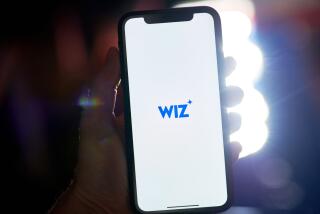Bidders in FCC Auction May Face Antitrust Suits
- Share via
The U.S. government plans to pursue bid-rigging charges against participants in a multibillion-dollar federal auction of licenses for wireless personal communications services, according to a federal securities document.
The threat of civil antitrust lawsuits was disclosed in a Securities and Exchange Commission filing by 21st Century Telesis II Inc., a Costa Mesa company formed to bid at Federal Communications Commission auctions for small companies seeking personal communications services licenses.
The disclosure indicates that antitrust officials in the Justice Department have concluded that some companies effectively colluded during FCC auctions by inserting special codes in their bids that signaled to others which licenses they wanted to buy.
The Justice Department has indicated that it intends to begin a civil proceeding against 21st Century, among others, the filing said. The company said it disputes the contention that the use of codes amounted to an attempt to rig the bidding. It declined further comment.
Any action, though, could be aimed more at stopping bidding abuses in future FCC auctions rather than punishing past bidders. Antitrust authorities “informally” told 21st Century that they’d give the company a chance to avoid monetary penalties or fines if it agrees to a settlement barring use of coded bids in future government auctions, the SEC filing said. The Justice Department declined to comment.
The FCC has been conducting its own review of bidding and so far has imposed fines in at least three cases of alleged collusion.
Antitrust charges would be the latest in a series of problems that have plagued the auctions of licenses to use the airwaves for personal communications services, or PCS, a next-generation competitor to cellular phones. Several big auction winners, such as NextWave Telecom Inc., for example, sought bankruptcy protection when they couldn’t pay for the licenses.
The Justice Department started its probe in early 1997 after a disgruntled Texas bidder, High Plains Wireless, complained to the FCC about alleged bidding improprieties in an auction that ended in January 1997.
High Plains complained that when it was seeking a license in Lubbock, Texas, a competitor submitted a bid for $1,375,013. The last three numbers, 013, were the same three digits that the FCC had assigned to a PCS license in Amarillo, Texas, which High Plains wanted to buy. The bid, High Plains charged, was a coded threat to drive up the price of the Amarillo license unless High Plains dropped out of the bidding for Lubbock.
Smaller companies such as Western Wireless Corp. and Powertel Inc., as well as industry giants such as AT&T; Corp., have acknowledged receiving civil subpoenas seeking information about the auctions.
21st Century said that during an auction that ended in May 1996, it used the FCC’s code for Indianapolis as the last three digits of a bid it placed on a license for Baton Rouge, La. The company ultimately won a license for Indianapolis at a later auction.
During the Justice Department probe, some bidders have said coded signals were common but didn’t amount to collusion because they never got together to coordinate bidding strategies.






